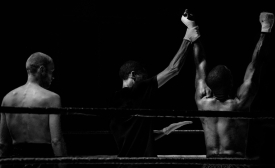Americas

A look at the U.S. State Department's ECA initiatives during Karen Hughes' tenure.
No, the above title doesn’t have a typo, a typo that occurs (to the embarrassment of those responsible for it, and to the amusement of those noticing it) when referring to that increasingly widespread international activity, public diplomacy (PD) -- which can be defined, to cite the U.S.
Sunni insurgents in Iraq have found a way to get their message to the world. It's via Internet, of course, but just look at this, from a new U.S. Government report released today.
Tempers at the TV newsrooms of Al Jazeera and Alhurra are flaring with the summer heat, so one can only imagine what August may bring.
The "New Alhurra" is on a fast track. In just over half a year, two of its embattled top leaders either slipped off the track or were pushed.
Larry Register is the latest news chief to exit the American government's Arabic satellite channel. The embattled former CNN newsman came in to lead Alhurra only last November.
This is the first in a series from Carrie Walters, Pickering Fellow at the U.S. State Department and Master's Candidate in Public Diplomacy at USC's Annenberg School for Communication.
Last March I wrote an essay for the Center's "Public Diplomacy Press and Blog Review" identifying what I believe to be a key problem with our nation's public diplomacy -- a lack of emphasis on informing people overseas about our nation's history. One thing that makes this an attractive approach is that it can be done for the most part with infrastructure that we already have in place. We don't need to reinvent the wheel.
This commentary was originally published by EurasiaNet on May 23, 2007
Canadians are growing increasingly jittery about their country’s military participation in Afghanistan. A majority of Canadians now wonder if the political cost of maintaining troops in Afghanistan is too high. They should realize that the cost of not being there would be even higher.







